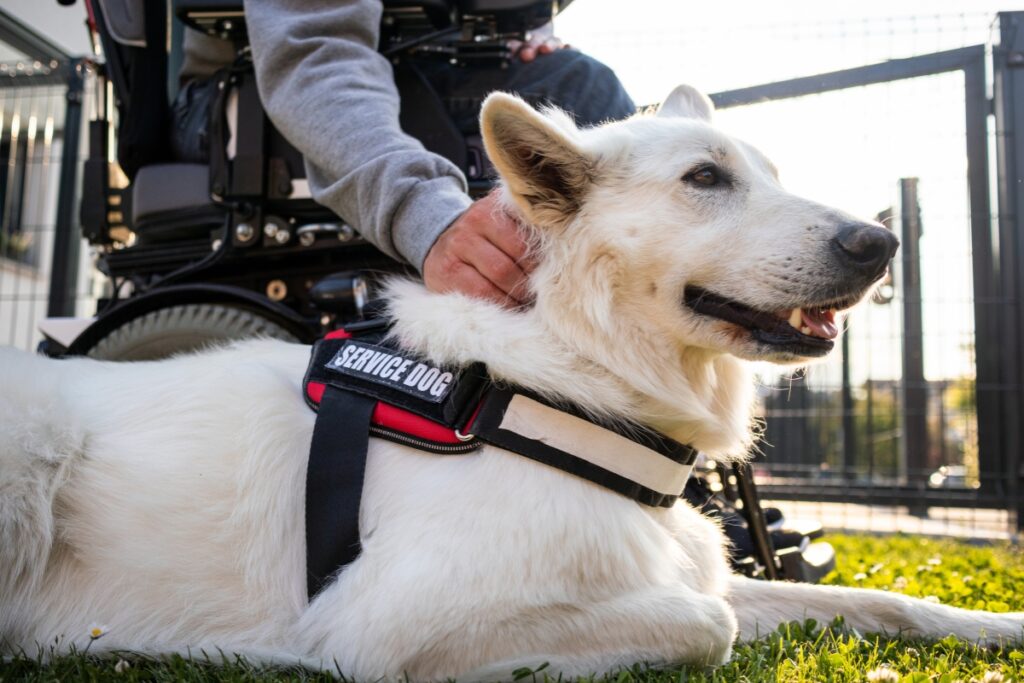Service dogs play a huge role in helping people with all kinds of physical, mental, and emotional challenges. From guiding those with vision impairments to sensing medical emergencies, these highly trained pooches make a huge difference.
1. Guide Dogs for the Visually Impaired
Guide dogs help individuals who are blind or have low vision navigate their surroundings. They’re trained to avoid obstacles, stop at curbs, and lead their handler around safely. This type of service dog offers more than guidance—they provide independence and confidence, making it easier for their handler to travel on their own in public spaces.
2. Hearing Dogs for Sound Alerts

Hearing dogs assist people who are deaf or hard of hearing by alerting them to important sounds. These dogs respond to doorbells, alarms, and other critical noises by nudging or pawing at their handler. By bridging the gap between sound and safety, hearing dogs help keep their handlers aware of their environment.
3. Seizure Response and Warning Dogs

Seizure-alert dogs have an amazing ability to sense seizures before they occur, often giving their handler precious moments to prepare. Some are also trained to fetch help, activate an emergency button, or stay by their handler’s side until the seizure passes. Their vigilance makes them indispensable companions for people with seizure disorders.
4. Mobility Assistance for Physical Limitations

Mobility assistance dogs perform essential tasks for individuals with physical disabilities. From retrieving dropped items to opening doors, these dogs help their handlers maintain independence. They’re also trained to offer support with balance or pull a wheelchair, making everyday activities more accessible for people with limited mobility.
5. Psychiatric Service Dogs for Emotional Support

Psychiatric service dogs assist people with conditions like PTSD, anxiety, and depression. These dogs are trained to sense distress and respond by interrupting harmful behaviors or providing comforting pressure during panic attacks. Their job may go beyond emotional support—they perform specific tasks that help their handler manage mental health symptoms.
6. Diabetic Alert Dogs for Blood Sugar Management

Diabetic alert dogs can detect dangerous shifts in blood sugar levels through their incredible sense of smell. They are trained to alert their handler when blood sugar is too high or too low, often before symptoms appear. Their ability to provide early indications allows people with diabetes to take action and prevent a medical emergency.
7. Cancer Detection Dogs for Early Warnings

Some service dogs are trained to detect certain types of cancer by smelling biological samples. Their keen noses can pick up the unique scent of cancerous cells, sometimes even before conventional medical tests can. Early detection of cancer is key to better treatment outcomes, making these dogs potentially lifesaving for those they assist.
8. Allergy Detection Dogs for Food Safety

Allergy detection dogs, trained to detect substances like peanuts, shellfish, or gluten, are lifesavers for people with severe allergies. These dogs sniff out allergens in food or the environment, alerting their handler before they come into contact with harmful substances. This makes navigating places like restaurants or grocery stores much safer.
9. Autism Support Dogs for Sensory Assistance

Autism service dogs are trained to help individuals on the autism spectrum by providing calming and stabilizing support. They assist in managing sensory overload by applying deep pressure or guiding their handlers away from overwhelming environments. Their comforting presence helps their handler stay grounded in public spaces.
10. Medical Alert Dogs for Emergency Assistance

Medical alert dogs support people with a variety of health conditions, such as heart problems or asthma, by detecting changes in their bodies. These dogs can remind their handler to take medication, alert them to impending health issues, or seek help during a crisis. Their fast response can help prevent medical situations from escalating into emergencies.
Service dogs offer far more than companionship—they are trained professionals who make everyday life safer and more manageable for countless people. These incredible dogs bring independence, comfort, and protection, proving just how powerful the bond between humans and dogs can be.







